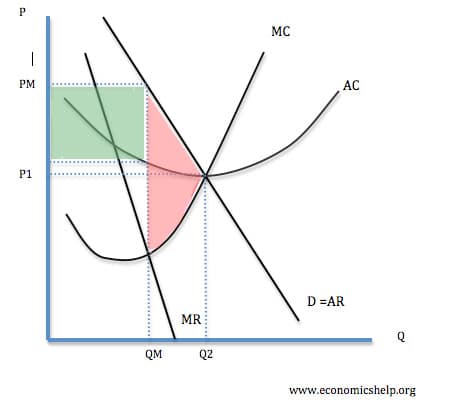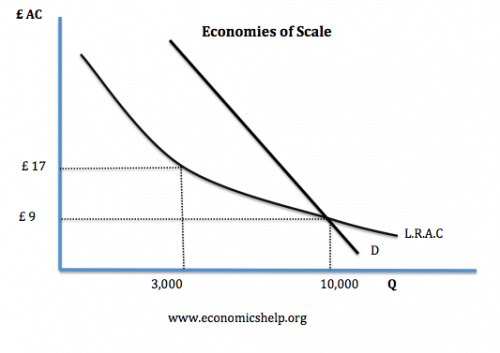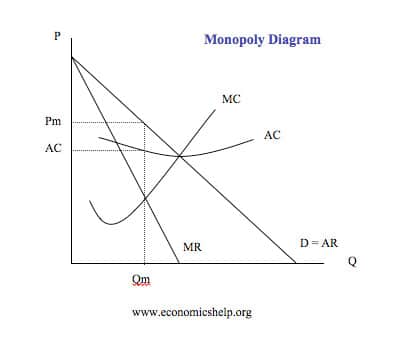Monopoly
Definition of Monopoly:
- A pure Monopoly is defined as a single seller of a product. i.e. 100% of market share.
- In the UK a firm is said to have monopoly power if it has more than 25% of the market share. For example, Tesco @30% market share or Google 90% of search engine traffic.
Monopoly Diagram
Problems of Monopoly
- Higher Prices. Firms with monopoly power can set higher prices than in a competitive market. (Green area is supernormal profit)

- Allocative Inefficiency. A monopoly is allocatively inefficient because in monopoly the price is greater than MC. (P > MC). In a competitive market the price would be lower and more consumers would benefit. A monopoly results in dead-weight welfare loss indicated by the red triangle.
- Productive Inefficiency A monopoly is productively inefficient because output does not occur at the lowest point on the AC curve.
- X – Inefficiency. – It is argued that a monopoly has less incentive to cut costs because it doesn’t face competition from other firms.Therefore the AC curve is higher than it should be.
- Supernormal Profit. A Monopolist makes Supernormal Profit Qm * (AR – AC ) leading to an unequal distribution of income.
- Higher Prices to suppliers - A monopoly may use its market power and pay lower prices to its suppliers. E.g. Supermarkets have been criticised for paying low prices to farmers.
- Diseconomies of acale - It is possible that if a monopoly gets too big it may experience diseconomies of scale. – higher average costs because it gets too big.
- Lack of incentives. A monopoly faces a lack of competition and therefore, it may have less incentive to work at product innovation and develop better products.
- Charge higher prices to suppliers. Monopolies may use their
supernormal profits to charge higher prices to suppliers.
- see also: Disadvantages of Monopolies
Advantages of Monopoly
1. Economies of scale

- If there are significant economies of scale, a monopoly can benefit from lower average costs. This can lead to lower prices for consumers.
- In the above example If there were 3 firms producing 3,000 units at an average cost of £17, average costs would be higher than a monopoly producing 10,000 units. Therefore, for natural monopolies and industries with significant economies of scale, monopolies can be more efficient.
Monopolies make supernormal profit which can be invested in Research & Development. This is important for industries like medical drugs.
3. A Firm may gain monopoly power because it is the most efficient.
Google gained monopoly power through offering innovative new products. It is hard to argue google has x-inefficiency because of its monopoly power.
- see also: Advantages of Monopolies
Evaluation of Monopolies
- It depends on the industry in question. For example, a monopoly is needed in a natural monopoly like tap water. However, for restaurants, there are not significant economies of scale and it is important to have choice. Therefore monopoly would be very inappropriate for restaurants.
- Some industries need a lot of research and development (e.g. building new aeroplanes, research drugs). Therefore, a monopoly may be needed in this industry.
- A government may be able to regulate monopolies to gain benefits of economies of scale, without the disadvantages of higher prices.
How Monopolies can develop
- Horizontal Integration. Where two firms join at the same stage of production, e.g. two banks such as TSB and Lloyds
- Vertical Integration. Where a firm gains market power by controlling different stages of the production process. A good example is the oil industry, where the leading firms produce, refine and sell oil.
- Legal Monopoly. E.g. Royal Mail or Patents for producing a drug.
- Internal Expansion of a firm. Firms can increase market share by increasing their sales and possibly benefiting from economies of scale. For example, Google became a monopoly through dominating the search engine market.
- Being the First Firm e.g. Microsoft has created monopoly power by being the first firm.
Regulation of Monopolies
Governements can regulate monopolies through- Price capping RPI-X to limit price increases
- Prevent mergers
- Investigating abuse of monopoly power, e.g. collusion

No comments:
Post a Comment